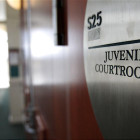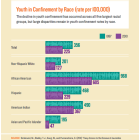
OP-ED: Why Don’t Youth Curfews Work?
|
Research consistently “fails to support the argument that curfews reduce crime or criminal victimization."
Juvenile Justice Information Exchange (https://jjie.org/tag/legislation/page/6/)

Research consistently “fails to support the argument that curfews reduce crime or criminal victimization."

Despite federal law recognizing child prostitutes as sex trafficking victims, many states are still treating commercially sexually exploited young people as criminals.

Attempts by Missouri legislators to override Gov. Jay Nixon’s veto of a bill that would have removed hundreds of individuals from state sex offender registries faltered earlier this month.

Massachusetts now includes 17-year-olds in its juvenile justice system. Only 10 states remain which place 17-year-olds under adult court jurisdiction.

The idea of hauling young offenders into court — and hoping lockup will change them — no longer appeals to a host of experts who work in the juvenile criminal justice system.

A proposal to return first-time, nonviolent 17-year-old offenders in Wisconsin to the juvenile justice system has broader bipartisan support than in the past but faces opposition from the state’s top law enforcement officer. Wisconsin is one of 11 states that try 17-year-olds as adults. The others include Georgia, Louisiana, Massachusetts, Michigan, Missouri, New Hampshire, South Carolina and Texas. North Carolina and New York try 16-year-olds as adults.

Is the Illinois DJJ providing adequate & required mental health and education services? Some are saying no.

California's Assembly Bill 12, signed in 2010, would extend foster care up to age 21.

In a bid to decongest the nation’s overpopulated prisons, the Obama administration has proposed leniency for certain drug cases.

Leaders and experts explore using brain science to craft new juvenile justice policies at a forum at the National Conference of State Legislatures.